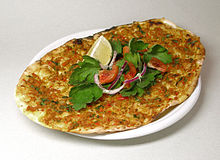Iraqi cuisine
In terms of agriculture, Iraq harks back to ancient Mesopotamia,[5][6][7] growing wheat and crops requiring winter chill such as apples and stone fruits.
[7] Lower Mesopotamia grows rice and barley, citrus fruits, and is responsible for Iraq's position as one of the world's largest producer of dates.
[10][4] One of three excavated cuneiform clay tablets written in 1700 BC in Babylon,[11][10] 50 miles south of present-day Baghdad, contains 24 recipes for stew cooked with meat and vegetables,[11] enhanced and seasoned with leeks, onion, garlic, and spices and herbs like cassia, cumin, coriander, mint, and dill.
Mezza is a selection of appetizers or small dishes often served with a beverage, like anise-flavored liqueurs such as arak, ouzo, rakı, sambuca, pastis, or various wines, similar to the tapas of Spain, or finger food.
[28] According to the myth, the word originated after World War I when Iraqi farmers declined to provide the British with rice to feed their soldiers in Basra.
[29] As such, when Iraqi porters used to hear British soldiers requesting them to carry the pouches of "Ten Men", they thought it meant rice in English.
Another recipe dating to the reign of Hammurabi (1792 BCE–1750 BCE) includes similar basic ingredients with the addition of grape syrup, figs and apples.
The tradition continues into the modern day, but the rich, syrupy desserts like baklava are usually prepared for special occasions or religious celebrations, as most daily meals are usually followed by a simple course of seasonal fruit, especially dates, figs, cantaloupes, nectarines, apricots, pomegranates, peaches, mulberries, grapes or watermelons.
[31] Others include: On February 20, 2023, a law was published banning the import, production and sale of all types of alcoholic beverages, punishable by fines of up to IQD 25 million.











